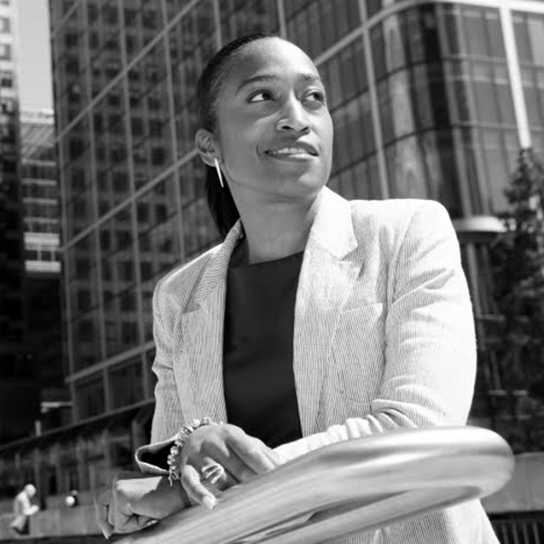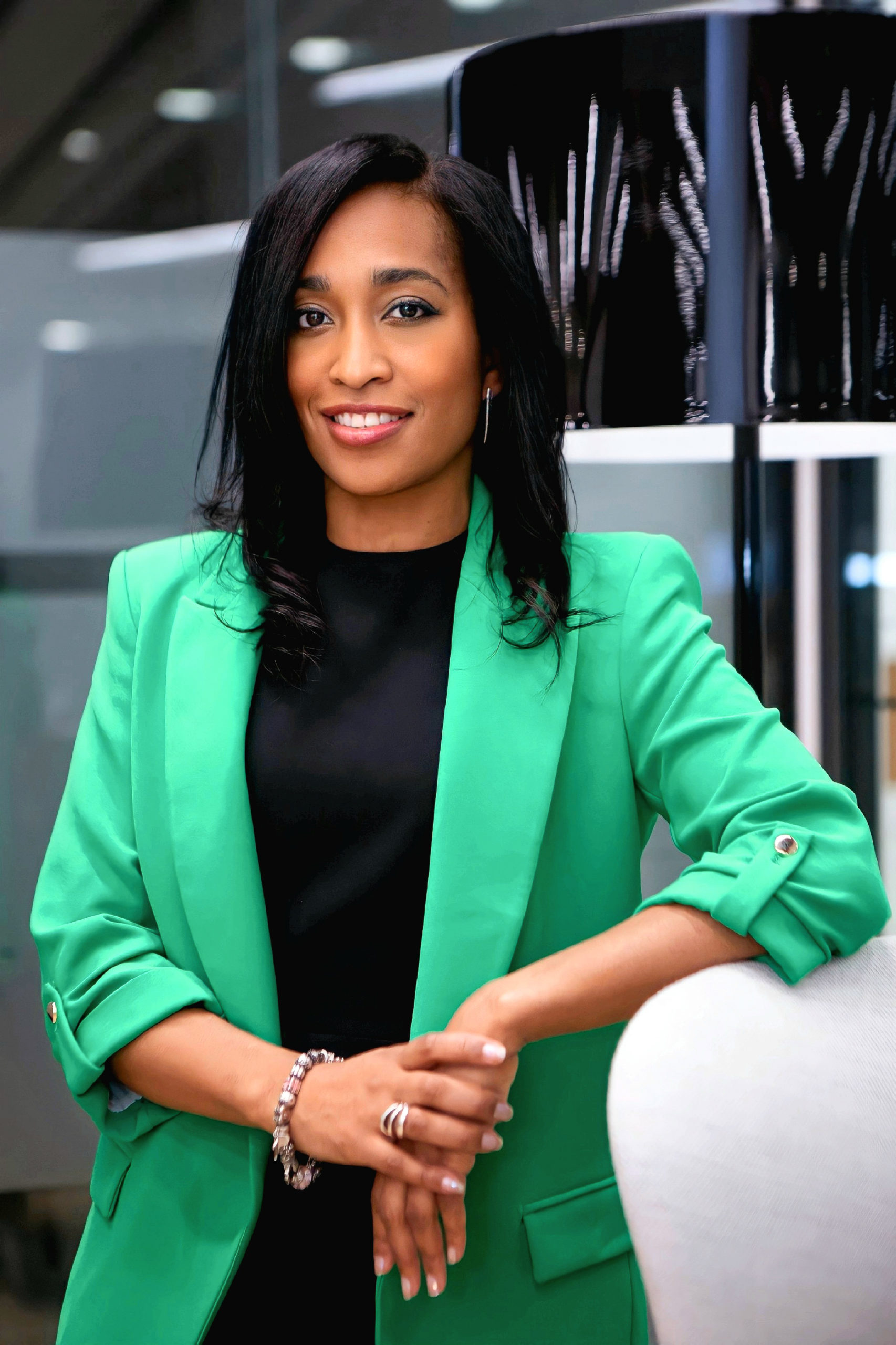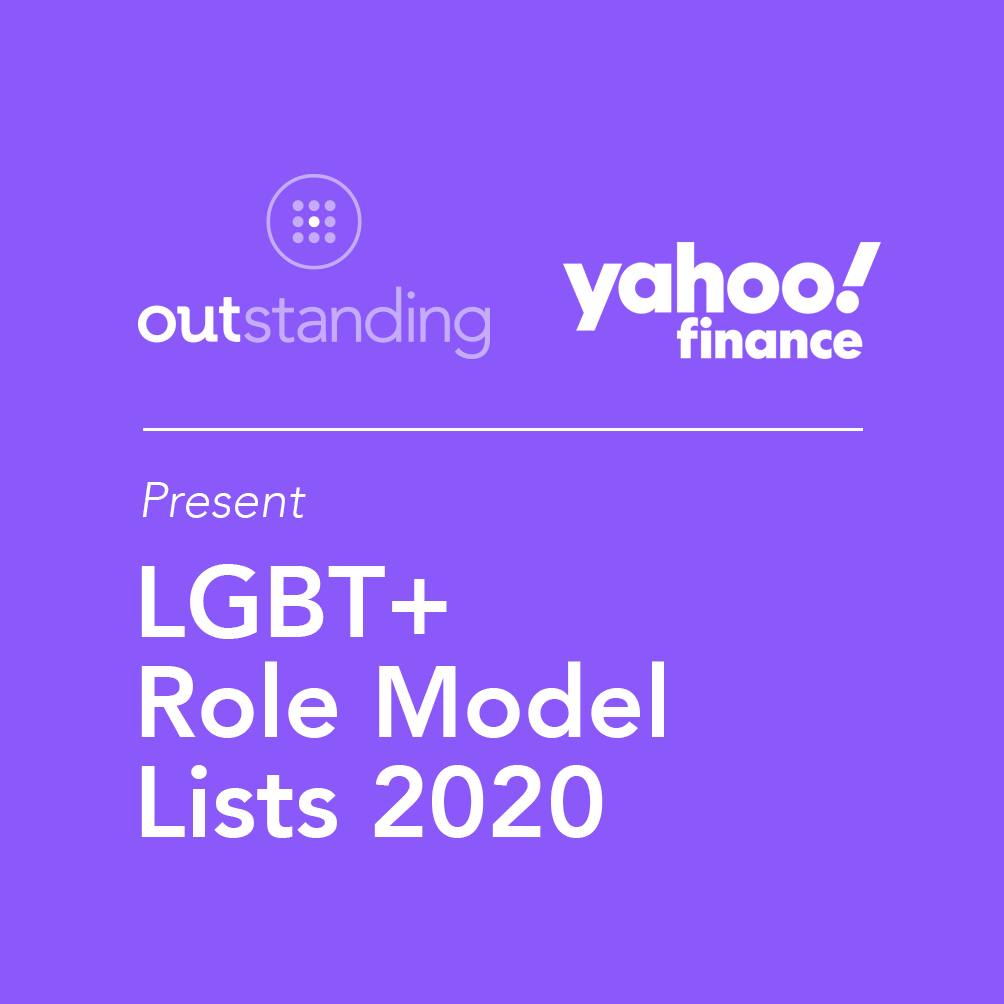
Leila Thomas
CEO & Founder of Urban Synergy, Seconded from Talent team at London Stock Exchange Group
We were delighted to sit down with Leila Thomas, Founder and CEO of Urban Synergy, Seconded from Talent team at London Stock Exchange Group, to talk about her career journey to date and unpick some of the core inclusion challenges in her industry.

From her positions as IT Network Rationalisation Delivery Manager at London Stock Exchange Group, to Founder and CEO of Urban Synergy, the award-winning London-based early intervention mentoring charity, Leila Thomas strongly believes that “if you can’t see it, you can’t be it”.
When it comes to helping young people build their confidence and aspirations, she says: “We all need role models, someone that is similar to us but has a voice.”
From the beginning of her career, Leila’s lived experience of having her own role models to look up to has shaped her success and how she views younger people’s own pathways to succeed. She has since taken strides in demonstrating her understanding, motivation and devotedness of mentoring young people’s journeys, working on three main pillars: inspire, guide and connect.
“As the youngest sibling in a large family, who all worked in technology or engineering, I already had a rite of passage into the tech industry,” Leila explained. “That knowledge and interest was passed on to me so I think it was inevitable that I would follow that path. If I could see it, I could be it.”
Having been listed in this year’s EMpower Role Model List and The Top 10 UK Black Role Models in partnership with Google, her remarkable career is one to take note of. She landed her first permanent tech role as an IT Systems Administrator and by her twenties, was working on multi-million-dollar global transformation projects at Reuters. She attributes her drive to the role models in her life.
“You always have to start off by saying your parents are your role models,” she laughed. “But my Aunty was instrumental. She was hugely influential to me because she had such a strong work ethic. She worked her way up from a Secretary to a Director at Citi Bank. I didn’t know what I wanted to be, I just knew I wanted to be successful, and she gave me the confidence to work for what I wanted.”
“My other role model was the Sudanese businessman Mo Ibrahim. I worked for him early in my career and saw how he treated everybody with respect and with exceptional leadership skills, while also always championing great causes and giving back to society.”
The shared trait of these role models is that they truly demonstrated ‘leading by example’. “The most crucial thing leaders can do,” Leila says, “is to take action and lead by example. If you actually do rather than say something in a statement, others will follow you.”

“Out of a building of 500 people, only 12 were women and 2 were Black. Once people got over the initial shock of ‘what are you doing here’ and my having to prove myself amongst the men, I learnt the importance of perseverance and resilience.”
So, Leila founded Urban Synergy (her biggest career achievement so far) while juggling a full-time role, being a mum, actively helping develop the Black Employee Network (BEN) within her workplace and sitting as a Governor for a local secondary school. The BEN gives Black and minority ethnic colleagues the opportunity to network with senior leaders to inspire the next generation, and creates a diverse, work-ready talent pipeline.
She reflects on her biggest regret where, very early on in her career, she didn’t pursue a Director position due to her lack of confidence, and now sustains the belief that if she had a mentor to challenge her and sponsor to champion her to step forward, she would have.
10 years later, Urban Synergy has helped mentor more than 10,000 young people between 10-18 years of age to reach their full potential through mentoring programmes, inspirational seminars and work experience.

Leila found a common issue with many young people struggling with direction, and that a lack of aspiration is often down to lack of representation in business – young people between 10 and 18 are in their most formative years and need to see a beacon of light to follow. She explains that the barrier preventing young people from aspiring to achieve is merely not seeing the opportunity or even knowing it exists or how to access it.
“Relatable role models and real time careers insight is what young people need to make decisions as they go through transition stages in school and in life,” she says. “I spoke with a teacher and a group of Black boys at risk of underachieving who said they didn’t see any Black role models like them in the areas they wanted to go, so that pathway just wasn’t visible to them.
“We need relatable role models from the classroom to the boardroom. We need to make sure young people who can see Canary Wharf from their bedroom window have the opportunity to get there.”
As a Black woman working in the technology industry, one renowned for being typically male-dominated, Leila faced some challenges, experiencing what it’s like to be “the outsider in the room in both race and gender”.
“Be brave, be an expert, be enterprising… and definitely get a mentor!”
“When I first started [in the tech industry], out of a building of 500 people, only 12 were women and 2 were Black. Once people got over the initial shock of ‘what are you doing here’ and my having to prove myself amongst the men, I learnt the importance of perseverance, resilience and being authentic.
“Since then, things have improved in the tech industry, but we need to continue raising awareness around inclusion in STEM (Science, Technology, Engineering and Mathematics) and help young people reach their full potential – this starts at ages as young as primary school. Children, particularly young girls, see themselves in the books they read, so we’ve got to bring these role models into schools to show them the vast variety of all the jobs available to them.”
To advance diversity and inclusion in all industries, representation starts with businesses taking on these attitudes and leading by example to break down the barriers for the next generations. Young people need to see more Black senior leaders to encourage them into these workplaces, reach their full potential and drive their aspirations. Leila relays that her lived experience means she’s witnessed the effects of overrepresentation in the community and the underrepresentation in the workplace, with a lot of unkind exclusion.
“Years ago, the company I worked for had a structural change and a new, more senior role appeared. It wasn’t advertised and someone was placed automatically. My team believed that I was the better fit and stood up for me and eventually, the opportunity presented itself and I secured the role. That’s also when I realised how important allyship is.
“It’s so important to say something and not just be a bystander. We need allies to act as active sponsors and use their influence to champion the progression of underrepresented groups both in and out of the workplace. We can’t do it alone. Teamwork makes the dream work, right?”
And that’s really been the driving factor for her; the basis of Urban Synergy was to combat negative stereotypes by creating a mentor resource pool made up of successful people within the community, and so through confidence building, guide young people in the direction they want to go. She set out with the mindset that helping just one person would be worth it. By using her skills and network, the charity has helped tens of thousands. “Your network is your net worth,” she says.
An even more impressive anecdote is the unexpected success she has seen throughout the pandemic. Leading a charity over the past year meant a sudden shift to remote management and automation which, in an industry entirely predicated on events and fundraising, proved to be challenging.
“We devised new online strategies for our programs and fundraising efforts whilst meeting our objectives, because we still had to be there for our community and keep them positive, prepared and focussed on their futures. Doing nothing wasn’t an option.”
The charity’s ability to pivot meant it reached significantly more young people in 2020 than the previous year. The power of technology; interactive seminars and one-to-one mentoring programmes meant more people were able to continue their paths from their homes. “Clouds and silver linings,” Leila says. “COVID-19 showed us that technology isn’t a subject option anymore, it’s a life skill. It runs through everything that you do. Which is why we need to continue to emphasise the importance of diversity and inclusion in STEM industries, for example like our STEMinars.”
Leilas’ work has earned her awards such as NBCPA Profile in Courage Award 2021, Mentor of the Year 2018 at the UK Social Mobility Awards, the Lewisham Mayor: Corporate Social Responsibility Award 2018, the UK Prime Minister: Point of Light Award 2014, European Diversity Award Winner 2013, Thomson Reuters Global Community Champion 2011 and Race for Opportunity: Business in the Community Leadership Award 2010.
When asked what advice she would give her 18-year-old self, she says: “Be brave, be an expert, be enterprising… and definitely get a mentor!”




